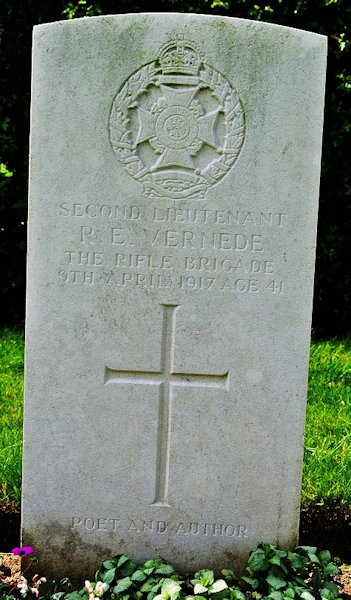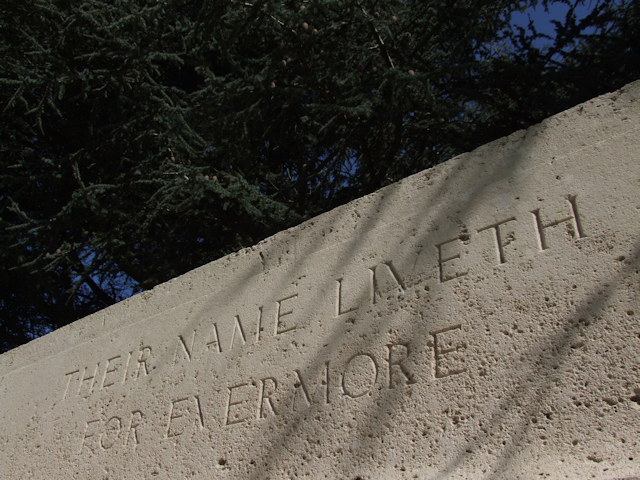Name
Robert Ernest Vernede
Conflict
First World War
Date of Death / Age
09/04/1917
41
Rank, Service Number & Service Details
Second Lieutenant
Rifle Brigade
5th Bn., attached 12th Bn.
Awards: Service Medals/Honour Awards
Not Yet Researched
Cemetery/Memorial: Name/Reference/Country
LEBUCQUIERE COMMUNAL CEMETERY EXTENSION
III. D. 16.
France
Headstone Inscription
Not Researched
UK & Other Memorials
Standon War Memorial,
St Mary’s Church Memorial, Standon,
Puckeridge Memorial Plaque, Standon Village Hall, Standon
Biography
Robert Ernest Vernede was a 2nd Lieutenant in the 5th Battalion, the Rifle Brigade (Prince Consort’s Own) attached to 12th Battalion. He died on Easter Monday, 9th April, 1917 at the age of 41.
He is buried in the Lebucquiere Communal Cemetery Extension, Pas de Calais, France. His grave reference is III. D. 16. The inscription on the bottom of his headstone reads: Poet and Author
He was the son of Oscar and Annie Vernede and husband of Caroline Howard Vernede.
Robert and Caroline lived at The Paper Mill, Standon. Robert Vernede was born 4th June 1875 and baptised 11th July that year at Ladbroke Grove and the baptism shows his father’s profession as a solicitor. As the articles below confirm, he attended St Paul’s School, where he honed his budding writing talent on an unofficial school magazine with a co-conspirator, G.K.Chesterton.
He married Caroline Fry 14th May 1902 at Monken Hadley and shortly after they came to live at the Paper Mill in Standon where they spent much time and effort in laying a tennis lawn and turning the grounds from a nettle and scrap iron strewn place into a beautiful garden.
When the war started he made a couple of attempts to sign up but was refused because of his age, eventually however, he managed to enlist in the Universities and Public Schools Brigade of the Royal Fusiliers as an ordinary soldier, his age being noted as 35 instead of 39. After some months training he realised he could be more use as an officer and applied for a commission, which he received in May 1915 in the Rifle Brigade and was soon in France. He sustained a wound and in spite of having the opportunity to stay at home insisted on re-joining his unit. The following Herts and Essex Observer item dated 21st April 1917 gives some details:
"Death of Second Lieutenant R.E. Vernede.
We regret to record the death of Second Lieutenant R.E. Vernede, Rifle Brigade, of the Paper Mill, Standon, which occurred on Easter Monday, from wounds received in action. Though four years over age at the time, Mr Vernede with true patriotism enlisted in the Royal Fusiliers at the beginning of the war, and in May, 1915, accepted a commission in the Rifle Brigade and went to France in November of the same year. In September 1916, he was wounded on the Somme, while in charge of his company and returned to the front three months later. On Easter Sunday, the day before he died, he wrote a very cheery letter to Mrs Vernede, which she received four days after his death. He was in the front line trench and full of confidence of British success. The heroic officer was a fine type of British soldier and it has been truly said of him that his death is a loss to England and the Empire. Sympathy is everywhere expressed for Mrs Vernede in her great bereavement. It was only in November last that she lost her brother, Sub-Lieutenant Howard Fry, who came from Canada and joined the Royal Naval Division. He was in the Gallipoli campaign and afterwards went to France and died at Beaumont Hamel, when it was captured by the Naval Division. The late Lieutenant Vernede was educated at St Paul’s School, and St. John’s College, Oxford, and was a man of wide knowledge and great ability. By profession he was a writer and attained eminence as a novelist, poet, writer of books of travel and contributor of articles to several of the leading journals. His best known novel was “The Pursuit of Mr Faviel” which has passed through several editions and is now published in the popular sevenpenny edition. His hobby was gardening and he spent much of his leisure in his delightful old world garden by the banks of the River Rib. He was fond of lawn tennis and wrote some charming articles on this most cosmopolitan of all ball games that appeared in one of the journals devoted to sport. He was the author of some beautiful poems which gave him a world-wide reputation. Several appeared in The Times, including ‘England to the Sea’, ‘To our Fallen’, and ‘The Call’, the latter having induced not a few men to flock to the colours. His pen is silent, he has fought the good fight and now rests in peace, and we complete our short memoir with one of his beautiful verses from ‘Before the Assault’, which has a striking and pathetic interest:
“Then to our children there shall be no handing
Of fates so vain - of passions so abhorr’d, -
But Peace - the Peace which passeth understanding
Not in our time - but in their time, O Lord.”"
At the close of the morning service on Sunday at Standon Parish Church the organist played the Dead March in “Saul” while the congregation remained standing as a tribute of honour and respect to the memory of the gallant officer who has so nobly fallen.
Another article from the Herts & Essex Observer of 4th August 1917 includes a tribute to Vernede from his contemporary at St Paul’s School, G.K. Chesterton and is followed by one of Vernede’s last poems:
"Posthumous Poem by Lieutenant R. E. Vernede
Mr G.K. Chesterton, who was at St Paul’s School with the late Lieut. R.E. Vernede, has written a touching memoir of his old friend in the recent number of “The Pauline.” He truly says that his death “may well be felt by the many who admired him as something almost like a gain, an addition or completion to that new and shining company of poets whose patriotism turned them into soldiers and gave them a life and death more worthy of a legend: those poets who have become poems.” The last poem he wrote, which was written in the trenches and has been published since his death, significantly bears out this view of the soldier poet’s death. We quote the beautiful poem which adds not alone lustre but a halo to the poet’s memory. It is entitled:
A PETITION
All that a man might ask thou hast given me, England
Birthright and happy childhood’s long heart’s ease
And love whose range is deep beyond all sounding
And wider than all seas:
A heart to front the world and find God in it,
Eyes blind enow but not too blind to see
The lovely things behind the dross and darkness
And lovelier things to be:
And friends whose loyalty time nor death shall weaken
And quenchless hope and laughter’s golden store.
All that a man might ask thou hast given me England
Yet grant thou one thing more,
That now when envious foes would spoil thy splendour,
Unused in arms, a dreamer such as I
May in thy ranks be deemed not all unworthy England,
For thee to die."
Although there were some important actions underway on 9th April 1917, such as the attack by the Canadians on Vimy Ridge and the assault on Arras the action in which Robert Vernede was mortally wounded was in the scheme of things a small skirmish and was truly a case of being in the wrong place at the wrong time. The following description is from a letter to Mrs Vernede from one of her husband’s fellow officers.
“He was in charge of his platoon on our advance and went forward with a Yorkshire Officer who was in charge of the Company on his right, with his Sergeant and Corporal and a couple of his men, and as far as I can gather, came right on top of an enemy machine gun and was seriously wounded. His men got him back to the Aid Station, but he did not survive the journey on from there.”
Acknowledgments
Di Vanderson, Jonty Wild



